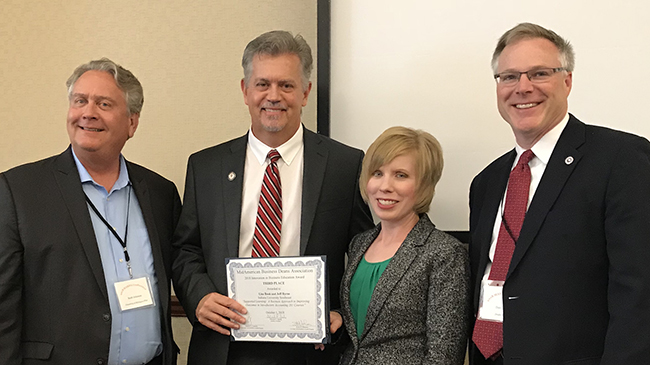
Dr. Scott Johnson, dean of the School of Management at the University of Michigan-Flint (l) and Dr. Daniel Connolly, dean of the College of Business and Public Administration at Drake University (r) present the MABDA Innovation in Business Education award to Jeff Byrne and Lisa Book, lecturers in accounting at IU Southeast. Photo courtesy of Jeff Byrne.
By Steven Krolak
(NEW ALBANY, Ind.)—Lisa Book and Jeff Byrne, lecturers in accounting, have won third place honors in the 2018 MidAmerican Business Deans Association (MABDA) Innovation in Business Education Award Program.
The awards seek to “encourage innovation in the pursuit of excellence in business education by recognizing creative and unique strategies or programs that advance the quality of education and the management of resources in business schools.”
The IU Southeast School of Business colleagues were recognized for their proposal entitled, “Supported Learning: A Business Approach to Improving Outcomes in Introductory Accounting 201 Courses.” It is based on an approach they co-developed and implemented in their introductory financial accounting courses beginning in fall 2017 to combat high DFW (D/F/withdraw) rates.
Supported learning takes “structural support” practices from the workplace and applies them to the classroom.
These supports include a variety of processes and procedures designed to improve performance.
Book and Byrne recognized the opportunity to apply them in their introduction to accounting courses.
“Accounting 201 is a difficult gateway course for business schools throughout the country and the one most students dread,” Byrne said. “It is to business school what organic chemistry is to nursing.”
With DFW rates in the course trending to 50 percent or more nationally, Book and Byrne refused to accept this outcome as normal for their own classes. Instead they and colleagues in academic leadership brainstormed a solution.
What emerged was a set of interlocking practices to expand communication, chart progress more closely, deliver feedback more often, offer immediate solutions for improvement, and provide a variety of educational support mechanisms—all interventions adapted from the real world.
As related in their paper, the support actions included:
- smaller class sizes to foster deeper instructor-student engagement
- a common course syllabus to enable students to sit in on different sections or transition from online to face-to-face
- pre-class adaptive learning modules to help students identify areas mastered or needing more study
- smaller and more frequent exams with immediate feedback
- mandatory student-instructor meetings early in the semester
- integration of “disruptors” like smartphones, tablets and other technologies
“Collectively, structured learning’s mixed methods approach provided a strong continuum of learning that motivated, supported and immediately rewarded student success,” Book and Byrne wrote.
In 2017-18, supported learning led to a decline in the DFW rate from 50 to 37 percent, while course grades rose by nearly 24 percent. For first-generation students, the course grade point increased by nearly 60 percent.
Beyond the positive results in their own classrooms, both Byrne and Book derive great satisfaction from having created something broadly beneficial.
“My payback has been the improved student performance,” Book said. “It’s nice to have someone else acknowledge that we have developed something that is not only unique but also transferable to other courses facing similar challenges.”
For his part, Byrne credits the project with intensifying his love of teaching.
“For us the real benefit was the ‘I Got It’ factor we witnessed in our students,” Byrne said. “This kind of student interaction is why we started teaching to begin with, and it is what continually motivates us.”


